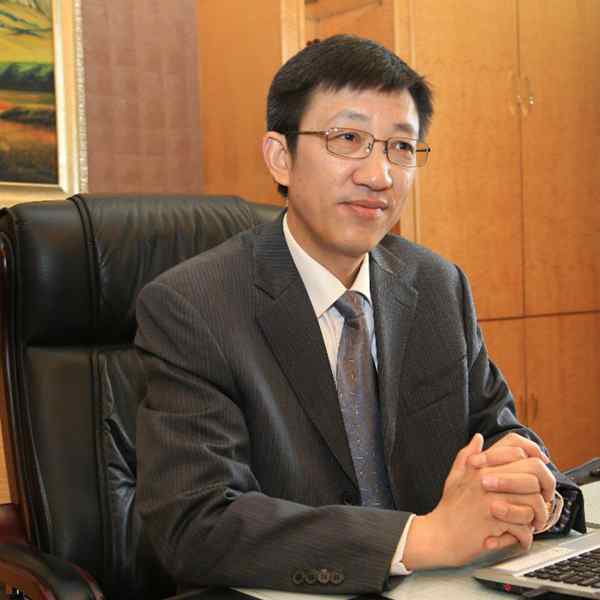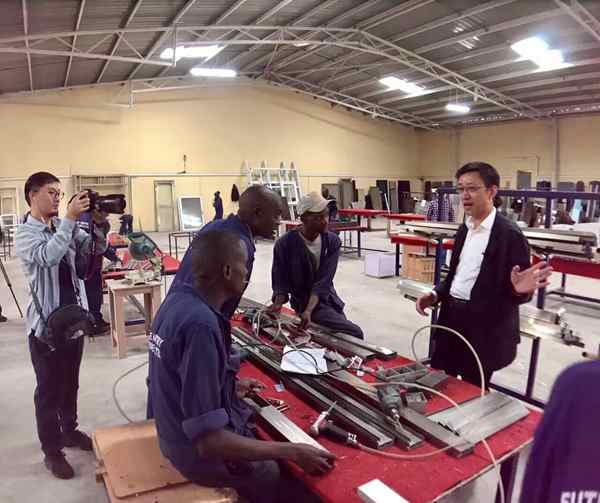


Yiqiao Yin in 1998 was amongst one of the earliest private Chinese businessmen to invest in Africa. Photo by Future Group
A Chinese businessman, Yiqiao Yin, better known as George Yin, plans to expand his business interests in Africa by setting up five small industrial parks for the production of daily-use household products like torch batteries, toilet paper, small electronic gadgets, etc. Talking to this reporter on November 14, 2017 in the Chinese capital, Beijing, Yin said he plans to begin constructing the first industrial park next year in Mozambique.
The remaining four will be located in four of the seven African countries where his companies already produce aluminum alloy windows and doors. “Each small industrial park will employ at least 1,000 people and cost about 50 million US dollars,” Yin explained. His company has so far invested about 100 million US dollars in seven African countries in the past 20 years. Yiqiao Yin says he is ready to invest in more African countries if the governments offer good incentives.
A former university Mathematics lecturer, Yin resigned his position to begin his own business. Today, he is General Manager of Future Group, FGC, and Chairman of the Hubei Chamber of Commerce in Africa, HCCA. He has been doing business in Africa for 20 years after starting off in Madagascar in 1998. He produces aluminum alloy windows, doors, shop booths and other building decorations, employing mostly local workers. He is also involved in building and decoration projects, building material trade, commercial real estate and other fields.

Future Group employs about 2,000 African workers in seven countries, with estimated investments of about 100 million US dollars in the past 20 years. Photo by Future Group
The company in Madagascar is now the biggest aluminum products concern in the country, with about 40 per cent of the market share. There are branches in every province and 10 shops in the capital, Antananarivo. The business in Mozambique began in 2001 and is also the biggest aluminum company in the country, with branches in some provinces. In all, Yin’s aluminum concern spans seven African countries – Madagascar, Mozambique, Tanzania, the Democratic Republic of Congo, Kenya, Angola and Uganda. The headquarters of his African businesses is Nairobi in Kenya.
FGC employs about 2,000 people in the seven countries, plus nearly 200 Chinese workers. Though he would not want to disclose his annual turnover, Yin describes FGC as small. “Compared to Chinese standards, the African market is still small; so my company is also small. I want to set up small industrial zones because China is the world’s manufacturing centre and many Chinese businesses are moving abroad. Africa is a good investment destination because the market is still growing,” Yin explained.
FGC’s China headquarters is in Wuhan, Hubei Province. It boasts three wholly-owned subsidiaries in the country, including an export processing base and supply chain centre in Wuhan and Foshan respectively. The company also has 8 wholly-owned subsidiaries and more than 60 marketing outlets in seven African countries, with the business scope covering more than 20 African countries and regions.
Future Group promotes values of “Common sharing, common growing” and a social responsibility principle of “Ensuring the economic and social development of the country where our company is located.” It has fostered more than 200 African local managerial and marketing talents, receiving acknowledgement from local leaders at various levels for its services.
*Kimeng Hilton Ndukong, a contributor to People’s Daily Online, is Sub-Editor for World News with Cameroon Tribune bilingual daily newspaper in Cameroon. He is currently a 2017 China-Africa Press Centre, CAPC fellow.
 Fire brigade in Shanghai holds group wedding
Fire brigade in Shanghai holds group wedding Tourists enjoy ice sculptures in Datan Town, north China
Tourists enjoy ice sculptures in Datan Town, north China Sunset scenery of Dayan Pagoda in Xi'an
Sunset scenery of Dayan Pagoda in Xi'an Tourists have fun at scenic spot in Nanlong Town, NW China
Tourists have fun at scenic spot in Nanlong Town, NW China Harbin attracts tourists by making best use of ice in winter
Harbin attracts tourists by making best use of ice in winter In pics: FIS Alpine Ski Women's World Cup Slalom
In pics: FIS Alpine Ski Women's World Cup Slalom Black-necked cranes rest at reservoir in Lhunzhub County, Lhasa
Black-necked cranes rest at reservoir in Lhunzhub County, Lhasa China's FAST telescope will be available to foreign scientists in April
China's FAST telescope will be available to foreign scientists in April "She power" plays indispensable role in poverty alleviation
"She power" plays indispensable role in poverty alleviation Top 10 world news events of People's Daily in 2020
Top 10 world news events of People's Daily in 2020 Top 10 China news events of People's Daily in 2020
Top 10 China news events of People's Daily in 2020 Top 10 media buzzwords of 2020
Top 10 media buzzwords of 2020 Year-ender:10 major tourism stories of 2020
Year-ender:10 major tourism stories of 2020 No interference in Venezuelan issues
No interference in Venezuelan issues
 Biz prepares for trade spat
Biz prepares for trade spat
 Broadcasting Continent
Broadcasting Continent Australia wins Chinese CEOs as US loses
Australia wins Chinese CEOs as US loses